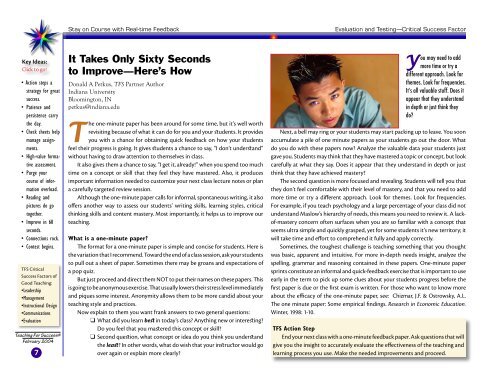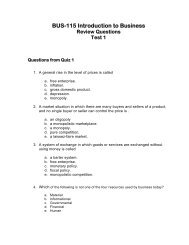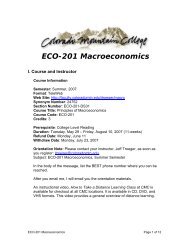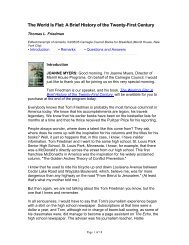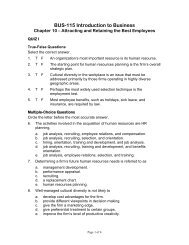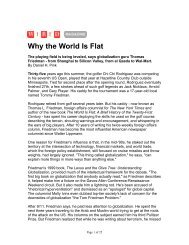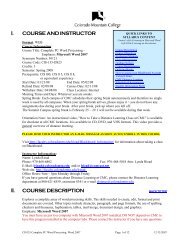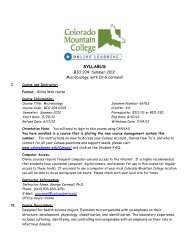Adding Visual LearningInstructional Design—Critical Success FactorKey Ideas:Click to go!• Action steps astrategy for greatsuccess.• Patience andpersistence carrythe day.• Check sheets helpmanage assignments.• High-value formativeassessment.• Purge yourcourse of informationoverload.• Reading andpictures do gotogether.• Improve in 60seconds.• Connections rock.• Contest begins.TFS CriticalSuccess Factors ofGood Teaching:•Leadership•Management•Instructional Design•Communications•EvaluationTeaching For Success®<strong>February</strong> <strong>2004</strong>6Art and the FrustratedEnglish StudentMuriel RyanIVY Tech CollegeTerra Haute, IN 47802mollysweet@hotmail.comEnthusiastic chatter fills the room as materialsare distributed. Students hunt for favorite colorsand lay their tools before them. This pictureseems very atypical for a classroom of freshmanEnglish students.These students taking English 031 and 032 havefallen under the reading comprehension standard setfor incoming freshmen. These are my students. Theiracademic histories vary. Some did reasonably wellin school, but it required many hours of studying toovercome a difficulty in remembering what they read.Some can read and pronounce each word, but find ita challenge to glean the meaning from the text. A fewfound high school a never ending frustration with fewoccasions to ever feel successful.My job is to increase their skill and confidence whenreading new material, increase their comprehensionby developing their study habits and challenge themto become more analytical readers.Probably the most formidable part of this teachingis helping them to integrate all the skills taught inthis class. Much of the time is spent learning newvocabulary, practicing study skills related to annotationand completing rather dull comprehension drills.Therefore, I find visualization learning activitieslifts their spirits and confidence as they do somethingcreative and fun. So I bring on the markers and theconstruction paper and put a bit of color and punchinto the classroom.In this learning mode, students are expected todemonstrate their learning by completing a visualproject to demonstrate their level of understanding.When they express abstract concepts in concreteterms, their creations are a good indicator of theircomprehension level. Art allows them to process theinformation given in lecture and practice in a newmode. By the use of color and their imagination, theycan express learned English concepts in their ownconstructs.Using this method, the products will be as varied asthe individual students. Employing visual methods thestudents are instructed to communicate concepts to eachother using the skills used by good readers.For example, one drew a car engine and labeledthe parts that drive the reader. The spark plugswere labeled vocabulary indicating the importanceof knowing words and their meaning. The pistonsrepresented the author’s organizational methods thatgenerate the power behind the way the author selectswords and places them in a specific order to logicallypresent ideas.Another student organized reading skills on neatbook shelves. Each shelf had a different resource forthe student to use in understanding challenging texts.Another student took the same information and placedeach resource on the pedals of a daisy with the centerlabeled “Critical Reader.”Using this teachingE a c h s t u d e n tmethod, the products visualized the interplaywill be as varied as the of reading skills andindividual students.resources and thentranslated that vision topaper.Another advantage to this method is that it requiresstudents to review previously presented material. Thisallows practice to be stimulating and not as rote. Italso sets a stage for the natural transference to a moresophisticated method of imagining facts and conceptsin alternative forms.For example, this can naturally lead to the use ofVenn diagrams that show the relationships of charactersin a narrative or the supporting details of a mainidea. Flow charts become a logical outgrowth of thistechnique. Lastly, this method clarifies and increases thevisual images used in learning thereby aiding studentswho are visual learners to be successful. This activity isa sensible complement to the often used lecture whichfavors students who are strong auditory learners.By encouraging students to see, create, select andorganize images, it places information in a familiar andcomfortable context. As an instructional method, it’samazing how colored markers and paper can combineto create a successful alternative learning mode.When seeking student feedback on my courses as awhole, the markers and construction paper activities isoften cited. These sessions are perceived as memorable,fun and interesting. Each student looks forward todoing it again and again.TFS Action StepAdd a component of drawing, art or creativevisualization to your instructional design. Plan agroup or cooperative learning activity involving theseconcepts. Ask for student reactions.
Stay on Course with Real-time FeedbackEvaluation and Testing—Critical Success FactorKey Ideas:Click to go!• Action steps astrategy for greatsuccess.• Patience andpersistence carrythe day.• Check sheets helpmanage assignments.• High-value formativeassessment.• Purge yourcourse of informationoverload.• Reading andpictures do gotogether.• Improve in 60seconds.• Connections rock.• Contest begins.TFS CriticalSuccess Factors ofGood Teaching:•Leadership•Management•Instructional Design•Communications•EvaluationTeaching For Success®<strong>February</strong> <strong>2004</strong>7It Takes Only Sixty Secondsto Improve—Here’s HowDonald A Petkus, TFS Partner AuthorIndiana UniversityBloomington, INpetkus@indiana.eduThe one-minute paper has been around for some time, but it’s well worthrevisiting because of what it can do for you and your students. It providesyou with a chance for obtaining quick feedback on how your studentsfeel their progress is going. It gives students a chance to say, “I don’t understand”without having to draw attention to themselves in class.It also gives them a chance to say, “I get it, already!” when you spend too muchtime on a concept or skill that they feel they have mastered. Also, it producesimportant information needed to customize your next class lecture notes or plana carefully targeted review session.Although the one-minute paper calls for informal, spontaneous writing, it alsooffers another way to assess our students’ writing skills, learning styles, criticalthinking skills and content mastery. Most importantly, it helps us to improve ourteaching.What is a one-minute paper?The format for a one-minute paper is simple and concise for students. Here isthe variation that I recommend. Toward the end of a class session, ask your studentsto pull out a sheet of paper. Sometimes there may be groans and expectations ofa pop quiz.But just proceed and direct them NOT to put their names on these papers. Thisis going to be anonymous exercise. That usually lowers their stress level immediatelyand piques some interest. Anonymity allows them to be more candid about yourteaching style and practices.Now explain to them you want frank answers to two general questions:❑ What did you learn best in today’s class? Anything new or interesting?Do you feel that you mastered this concept or skill?❑ Second question, what concept or idea do you think you understandthe least? In other words, what do wish that your instructor would goover again or explain more clearly?You may need to addmore time or try adifferent approach. Look forthemes. Look for frequencies.Itʼs all valuable stuff. Does itappear that they understandin depth or just think theydo?Next, a bell may ring or your students may start packing up to leave. You soonaccumulate a pile of one minute papers as your students go out the door. Whatdo you do with these papers now? Analyze the valuable data your students justgave you. Students may think that they have mastered a topic or concept, but lookcarefully at what they say. Does it appear that they understand in depth or justthink that they have achieved mastery?The second question is more focused and revealing. Students will tell you thatthey don’t feel comfortable with their level of mastery, and that you need to addmore time or try a different approach. Look for themes. Look for frequencies.For example, if you teach psychology and a large percentage of your class did notunderstand Maslow’s hierarchy of needs, this means you need to review it. A lackof-masteryconcern often surfaces when you are so familiar with a concept thatseems ultra simple and quickly grasped, yet for some students it’s new territory; itwill take time and effort to comprehend it fully and apply correctly.Sometimes, the toughest challenge is teaching something that you thoughtwas basic, apparent and intuitive. For more in-depth needs insight, analyze thespelling, grammar and reasoning contained in these papers. One-minute papersprints constitute an informal and quick-feedback exercise that is important to useearly in the term to pick up some clues about your students progress before thefirst paper is due or the first exam is written. For those who want to know moreabout the efficacy of the one-minute paper, see: Chizmar, J.F. & Ostrowsky, A.L.The one minute paper: Some empirical findings. Research in Economic Education.Winter, 1998: 1-10.TFS Action StepEnd your next class with a one-minute feedback paper. Ask questions that willgive you the insight to accurately evaluate the effectiveness of the teaching andlearning process you use. Make the needed improvements and proceed.


